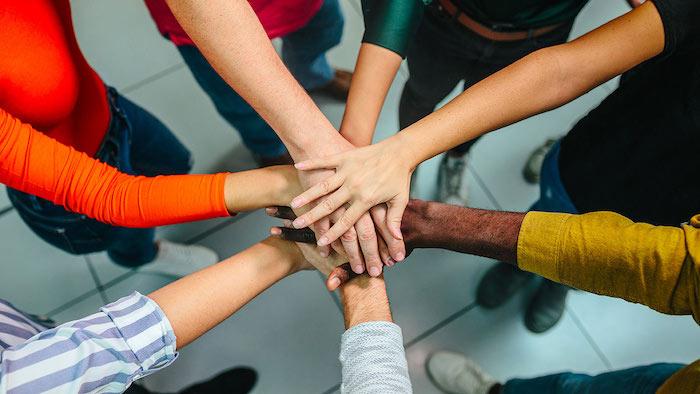'We Take Care of Our BMS Family' - Bristol Myers Squibb Cancer Support Network
Bristol Myers Squibb’s internal, peer-to-peer Cancer Support Network is a ‘gamechanger’ for employee patients and caregivers.

Originally published on Bristol Myers Squibb News & Perspectives
In 2019, Mianna Burnett, manager, Business Operations, Bristol Myers Squibb, and her husband were rocketed into the most trying time in their lives — her husband was diagnosed with cancer. Then, in October 2020, she received her own diagnosis.
It was a total gamechanger, she said.
“CSN offers the support you didn’t think you needed,” she said. “Hearing people speak about their stories as a caregiver and a patient and then how it translates into their work life has just been so helpful,” said Burnett, who is currently in remission alongside her husband.
CSN launched in early 2020. In 2019, Joanne Ford, a Transactional Law paralegal who lost her mother to cancer, found difficulty navigating her manager’s cancer diagnosis, and felt she couldn’t be the only one experiencing this situation in the workplace. She connected with Tinamarie Duff, global lead of the Disability Advancement Workplace Network (DAWN) People and Business Resource Group (PBRG) and was asked if she would like to lead a pilot program to support colleagues such as herself, as well as colleagues who were patients. From there, Ford quickly found herself leading and developing the Cancer Support Network. Today, CSN has connected Bristol Myers Squibb employees from around the globe offering them support and resources in the workplace.
“This is how we take care of our BMS family,” Ford said. “CSN provides support in the workplace, and that support doesn’t stop at the end of the workday. Most of us close our computers at 5 or 6 p.m., but that colleague who has just been diagnosed, or whose spouse or child has just received a cancer diagnosis, doesn’t have to feel alone if they’re up at 1 a.m. and in need of support. They can open their laptop and find resources to help them, at any time of the day or night.”
The CSN is designed to support all Bristol Myers Squibb employees in the workplace who have in some way been affected by cancer — patients, survivors, caregivers or colleagues of someone diagnosed. Its format leverages the collective experiences of its members, internal and external resources and experts to assist employees in their cancer journey. Since its launch, the CSN has expanded beyond the U.S. to Brazil, Argentina, Switzerland and the UK. The network recently launched small group sessions, which requires volunteer facilitators to undergo special training to serve as group moderators. CSN also has plans to launch a CSN Let’s Meet platform for those members who desire a more intimate one-on-one interaction with other members going through similar situations.
For Axel Spring, senior director, Worldwide Hematology in Boudry, Switzerland, CSN has been instrumental as he navigates life as a caregiver to his wife.
“Being able to share in what I would call a ‘second circle’ of people who are your colleagues, who are going through what you’re going through, it’s a great relief. You feel like you’re on a VIP list of colleagues who speak the same secret language,” he said.
Kevin Myers, manager, Clinical Trial Logistics Network in Moreton, UK, discovered the CSN last year through a Yammer post, and was quickly drawn in. Six months earlier, he was diagnosed with cancer. Myers quickly got involved in CSN activities and through his involvement he found the courage to share his story, something he found difficulty doing previously, especially while working remotely and feeling disconnected from colleagues.
“Having the CSN takes a lot of the pressure off leaning on your family and your friends, who bear the brunt of it,” he said. “I really enjoy the interactions within CSN — it’s a chance to relax and talk openly. I really feel connected to the company again, and there is a lot of joy in that.”
Gaining a new perspective has been most valuable for Brazil Distribution Manager Patricia Mossero. She discovered CSN shortly after her mother was diagnosed, and she was grateful to find “a whole world of people from the company who shared the same experience,” she said.
“CSN gives employees another optic about what we do every day — the patient can be anyone. It makes our purpose even more real,” she said.

